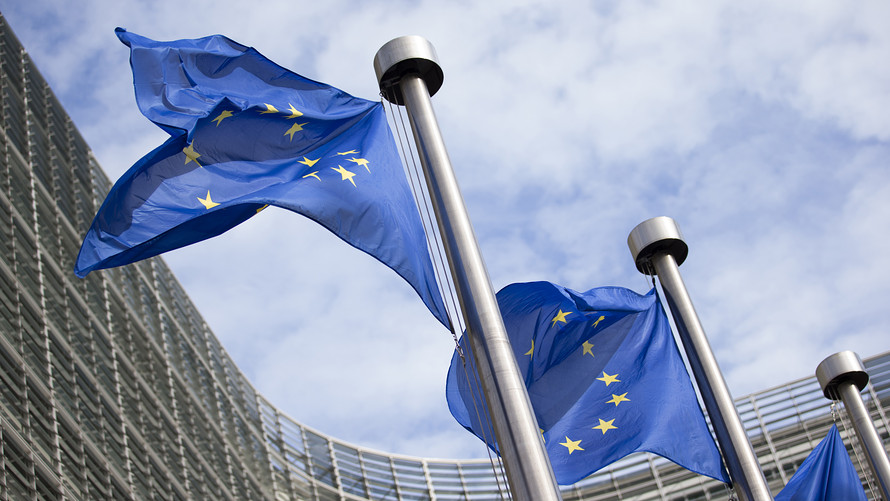
European stocks ended a bouncy session slightly higher on Friday, tracking gains for U.S. stocks as traders waded through a stream of corporate updates.
How markets are trading
After shifting between small gains and losses through the day, the Stoxx Europe 600 index SXXP, +0.22% ended 0.2% higher at 381.16. That helped swing the pan-European benchmark into positive territory for the week, ending with a 0.1% weekly gain.
France’s CAC 40 PX1, +0.15% closed up 0.2% at 5,317.37, while Germany’s DAX 30 index DAX, +0.18% rose 0.2% to 12,483.79.
Underperforming the major European indexes, the U.K.’s FTSE 100 UKX, -0.11% dropped 0.1% to 7,244.41.
The euro EURUSD, -0.2757% bought $1.2296, down from $1.2332 late Thursday in New York.
The yield on the 10-year German bond TMBMKDE-10Y, +0.00% fell 5 basis points to 0.650%, according to Tradeweb. Yields fall when prices rise.
What’s driving markets
European equities this week have largely followed moves on Wall Street. Analysts have said the recent global rout in stocks stemmed largely from concerns that a quickening pace of U.S. inflation could prompt the Fed to raise interest rates more than anticipated this year.
In its latest report to Congress, the Federal Reserve gave no signs it was planning to hike rates faster than currently expected, reflecting uncertainty among senior officials about how fast inflation will rise this year.
U.S. stock moved firmly higher on Friday, after the S&P 500 SPX, +1.60% and the Dow Jones Industrial Average DJIA, +1.39% finished Thursday with gains.
What strategists are saying
“Fears revolving around rising inflationary pressures and rate hike jitters have certainly left investors skittish this trading week. Investors seem to be on edge about higher interest rates and as such, this continues to encourage global equity bulls and bears to engage in a tough tug of war,” said Lukman Otunuga, research analyst at FXTM.
“With investors on guard as global stock markets become increasingly sensitive to the prospect of rising inflation and interest rates, equity bears could steal the show,” he said in a note.
Stock movers
Royal Bank of Scotland Group PLC RBS, -4.82% RBS, -3.78% shares dropped 4.8% as the majority state-owned lender posted its first full-year profit in 10 years. However, RBS said it has yet to agree a settlement with the U.S. Department of Justice over alleged mis-selling of mortgage-backed securities.
Phoenix Group Holdings shares PHNX, +7.31% jumped 7.3% after the insurer said it bought Standard Life Assurance Ltd. from Standard Life Aberdeen PLC in a reverse takeover for £2.93 billion ($4.09 billion). Shares of Standard Life Aberdeen SLA, -2.49% ended down 2.5%.
Deutsche Telekom AG DTE, +3.19% shares rose 3.3%. The German telecommunications company said late Thursday it had returned to profit in the fourth quarter of 2017, largely boosted by the effects of U.S. tax reform.
Swiss Re SREN, +2.46% rose 2.5% after the reinsurance heavyweight said it’s not considering issuing new capital. The company did say it’s “carefully assessing” the implications of a deal with SoftBank Group Corp. 9984, +1.38% , and it reported a fall in net profit in 2017.
Valeo SA FR, -11.09% tumbled 11%. The French automotive supplier said late Thursday its 2017 net profit fell year-on-year, despite both sales and order intake increasing.
International Consolidated Airlines Group SA shares IAG, -5.69% ICAGY, -4.62% fell 5.7%. The British Airways parent said it was engaging a €500 million share-buyback program, and that pretax profit rose in 2017. The results were “mixed,” said Accendo Markets, with revenues in line. while adjusted per-share earnings of €1.02 fell short of a €1.06 consensus estimate.
Economic data
Economic activity in Germany slowed toward the end of 2017, but a booming export sector kept Europe’s largest economy on a solid growth path, according to new data. Germany’s Federal Statistical Office said gross domestic product grew 0.6%, or an annualized rate of 2.5%, in the fourth quarter, easing somewhat toward the end of 2017. The report confirmed preliminary figures.
Eurostat confirmed that eurozone inflation was at 1.3% in January, down from 1.4% in December.

